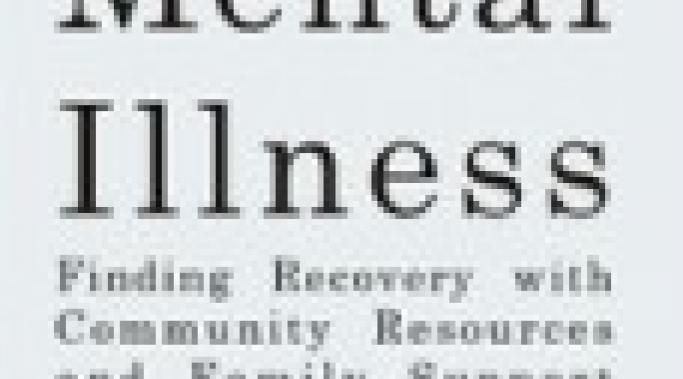Bette Midler's hit song of 1973, "(You Got to Have) Friends" includes the following lyrics:
Standing at the end of the road, boys
Waiting for my new friends to come
I don't care if I'm hungry or bored
I'm gonna get me some of them
For so long, these words described the life of my son Ben, as he restarted his emotional life after multiple hospitalizations with a diagnosis of Schizophrenia.
Mental Illness in the Family
Well, it looks as if SAMHSA has redefined the term: Recovery.
ScienceDaily (Jan. 5, 2012) — A new working definition of recovery from mental disorders and substance use disorders is being announced by the Substance Abuse and Mental Health Services Administration (SAMHSA).
The new working definition of Recovery from Mental Disorders and Substance Use Disorders is as follows: A process of change through which individuals improve their health and wellness, live a self-directed life, and strive to reach their full potential.
So, what do you think?
Ben has been "in recovery" since late in 2003, after his medication regime was stabilized and deemed effective. We cross our fingers each and every day that the psychiatric medications continue to work, and that he continues to take them despite his feeling that he doesn't need to.
And so it goes.
First of all: a very Happy New Year to you! May your 2012 be filled with possibility, community, love and peace.
2011 was an amazing year for our family. Inside our walls, it brought changes that were both discouraging (Ben's reduction in services, leading to a relapse that could have been avoided - down the chute in Chutes and Ladders) wonderful (eventual return to medication, and restoration of baseline; back to good grades at school and a job!!), and challenging (family role upped to that of unofficial supervisors of Ben's official caseworkers - don't get me started). As I often remind myself, it is what it is. This is what we must do right now to keep Ben healthy and productive.
It is not, nor can it be, a forever choice to drive him to work or school every day, to personally make sure he takes his meds after eight years of having that taken care of in the group home where he is no longer allowed to live ("too functional" --- yeah) But for now, it is what we must do, and the results are more than worth it.
I just finished reading another mother's memoir about her son's schizophrenia called This Stranger, My Son. I'd not heard of this one until a media producer I was working for (as voice talent) suggested I read it. Evidently she had read it in high school, years ago, and it has stayed with her ever since.
I come home from the drugstore with a bagful of meds - for me this time. With threatening bronchitis and a theatre show to do in two days, I must take care of this cough and cold, and nature is just not cutting it alone this time.
Ben watches me unpack my goodies - four prescriptions in all - and line them up on the counter. This is a familiar sight, one we create every morning and evening when Ben stays with us. The rule? We supervise him as he takes them, and for 15 minutes afterward. No judgment, no explanations, no trying to "convince" him that he needs the meds.(More info on psychiatric medications here) It is, simply, the rule. So far, so good. One lesson I've learned while parenting Ben from toddlerhood on, is that explanations often lead to loopholes he tries to widen and leap through.
We are getting along so well these days. Much of it has to do with Ben's self-esteem having returned to his "baseline functionality" after this summer's relapse. So, I feel comfortable enough to start the following exchange:
If there's anything I know about parenting, it is this: Parenting is the single most humbling experience you can have. You make plans for this child you have helped to "create", and life simply has other things in mind for him or her.
Oh, yes, you are a big part of the child's journey - but in full control? To paraphrase comedienne/author Julia Sweeney's excellent book: God Says, Ha!!
The best-laid plans are only that: plans. Want your kid to be President? (yikes, who would want that?!?!) He or she had better want that too - and have the gifts to go along with the desire.
A few years after Ben was diagnosed with schizophrenia, a friend sent me to a "psychic astrologist" I'll call Zena.Don't laugh. I was freshly unemployed after years of radio broadcasting, still getting used to the changes that my son's schizophrenia had brought to our family, and in the process of looking for an agent and publisher for my book about it, Ben Behind His Voices.
And, also, why not? I had gotten advice from worse places, believe me.
November was National Family Caregivers Month. An estimated 65 million Americans care for a family member. Of course, that is not just for families dealing with mental illness; that statistic accounts for those caring for loved ones with other physical and mental conditions, but also does not account for the number of families who are dealing emotionally with mental illness in a member even if direct care-giving is not a part of the picture right now.
I had the honor of being interviewed on several media outlets last week, and National Family Caregivers month drew to a close. The "month" may be over, but the job goes on. Here is one interview here, from "Reality Check" on Daytime TriCities.
So many kind readers have written to me about Ben Behind His Voices and have expressed gratitude not only for the way we share our story, but for the resources included as the drama unfolds. These letters have reinforced the fact that so many are still confused about how to navigate the symptoms, the rules, the systems we encounter when mental illness affects the family. I am among the confused, still. It seems there is always more to learn. (insert sigh here)
Enter this book, by Paul Komarek and Andrea Schroer:
Defying Mental Illness: Finding Recovery with Community Resources and Family Support
Today's Thanksgiving post features a guest blogger named Erik, with his kind permission. I am so grateful that Ben Behind his Voices is being read not just by families dealing with mental illness, but also by healthcare providers such as psychiatrists, nurses and social workers, and by those who have a mental illness diagnosis themselves.
Erik's story both touched my heart and taught me a lot on this Thanksgiving day, as I continue to learn about points of view that are different from mine - as a mother/caregiver of someone with schizophrenia.
Especially in the beginning, when a family is dealing with a loved one's mental illness, it's easy to become embroiled in the emotion of it all. In this television interview, I discuss the 5 points to remember about mental illness in the family.








